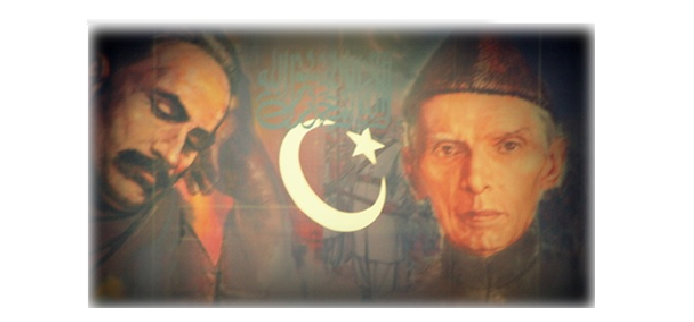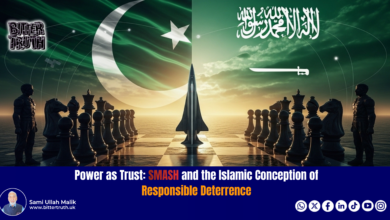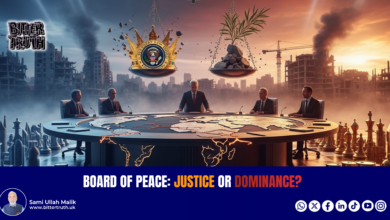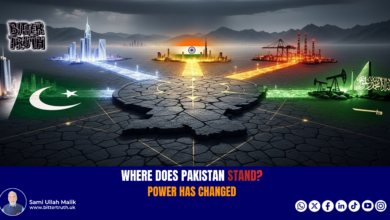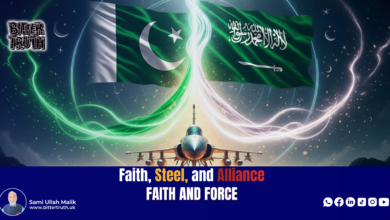Jinnah, Allama Iqbal and Pakistan
Allama Iqbal’s speech is an extremely accurate analysis of the history of human thought and action. Based on his extraordinary insight, he drew many far-reaching conclusions from historical events, some of which have not yet occurred. This poem of his is based on Its reality.
حادثہ جو ابھی پردۂ افلاک میں ہے
عکس اس کا مرے آ ئینہ ادراک میں ہے
The accident that is still in the sky
Its mirror image is in perception.
Iqbal paid particular attention to the history of the Muslims of the subcontinent. Cultural impressions are indelible. Although the Muslims here were less in number than other nations and scattered in different areas, but the belief of Tawheed always kept them connected in the unity of Islam. Several Muslim dynasties ruled here for over a thousand years, among them the Ghaznavids, Ghori, Khilji, Tughlaq, Lodhi and Mughal dynasties. Although these governments were named after the above-mentioned families, but because they were built on the basis of Islamic principles and strived to protect and propagate Islamic values, they are remembered as Islamic governments. Their rulers were Muslims. And they called Islam the identity and form of distinction of their government. They used Islamic laws in their established courts, established madrasas and mosques and promoted Islamic teachings and traditions and the language and literature of Muslims in them, often sultans. At that time, while respecting and honouring Sufiya and scholars and receiving instructions from them, Sufiya always advised the sultans to be just and benevolent with their subjects.
After Muhammad bin Qasim, Mahmud Ghaznavi opened the doors of India for Muslims, Mahmud Ghaznavi declared Delhi as Darul Sultanate of Muslim government. All the Muslim kings and rulers declared their government to be religion base of Islam and each of them named themselves as the preacher and protector of the religion and the manifestation and witness of its greatness. Mu’azuddin Ghori, Qutbuddin Aibak, Shamsuddin Al-Tamish, Rakinuddin Firoz Shah, Ghiyasuddin Balban, Alauddin Muhammad Shah, Zahiruddin Babur, Nasiruddin Humayun, Jalaluddin Akbar, Nuruddin Jahangir, Shahabuddin Shahjahan and Mohiuddin Aurangzeb Alamgir and others. It is known that the sultans insisted at the time of enthronement that they would always strive to protect and promote religion. If a king neglected to publish religious matters, the Sufis and scholars would warn him and encourage him to reform. In Sofia, Nizamuddin Auliya, Bahauddin Zakaria, Sharafuddin Buali Qalandar, Jalaluddin Bukhari, Sheikh Ahmad Sirhandi and Shah Waliullah Sultan were urging the observance of Islamic rules.
Allama Iqbal paid tribute to the great rulers of the history of the sub-continent, Mahmud Ghaznavi, Aurangzeb Alamgir, Ahmad Shah Abdali and Tipu Sultan are particularly noteworthy. And they fought against false forces. In the 18th century, when the great society of Muslims fell into sedition, corruption and disorder due to the moral immorality of kings and nobles, the power went into the hands of the British. After that, in the awakening of Muslims, Sir Syed Ahmad Khan, Shibli Naumani, Maulana Hali, Akbar Ala Abadi and above all Allama Iqbal played an extremely important role. Keeping in view the historical role of the Hindu nation and its contemporary dangerous ambitions, Allama Iqbal dedicated his intellectual and practical energies to protect the religion as complete way of life, wealth and civilization of the Muslims. He said:
“It is our duty to worry about the future generations, lest their lives become like those of the Gonds and Bhails and their religion and culture gradually perish in this country.” He presented the idea of an independent state for the protection and survival of the thousand-year-old Islamic civilization. According to him, religion is just a philosophy without power. He said, “If we want Islam to survive as a civilizational force in this country, then It is necessary for him to establish his centrality in a certain area.
Allama Iqbal could not imagine the life of a Muslim without Islam, he wanted to protect the freedom of Muslims only for the implementation of Islam. He said: “If the aim of the Muslims in India is merely freedom from politics and economic prosperity and the protection of Islam is not a factor in this aim as is evident from the attitude of today’s nationalists, then the Muslims will never succeed in their aims.” Allama Iqbal is the greatest poet of Azadi Watan in our literary history. In this regard, the songs of his speech are freedom and independence, but he did not even imagine Azadi Watan without Islam. He said in a serious tone “If the result of India’s independence is that it remains the same as it is, or becomes even worse, then the Muslim curses such an independent country a thousand times.” Allama Iqbal had demanded the formation of an independent Islamic state in the subcontinent simply so that the Islamic Shari’ah could be implemented so that as a result every person would get a guarantee of livelihood. In this regard, he wrote in a letter to the Quaid-A-Azam, “After a long and deep study of Islamic Shari’ah, I have come to the conclusion that if Islamic law is understood and implemented in a reasonable manner, every A person can be satisfied by at least a modest livelihood, but in the absence of an independent Islamic state or a few such states, the implementation of the Islamic Shari’ah is impossible in this country.
He made it clear to the Muslims that the only way for the salvation of the Muslims in the subcontinent is to give up the concept of Indian nationality and make Islamic nationality their identity because Islam alone can protect them from the present disastrous situation. Mentioning the great favours of Islam on Muslims, he said: “Islam was the biggest ingredient that affected the lives of the Muslims of India.” Thanks to Islam, the hearts of the Muslims were filled with those feelings and emotions on which the life of the parties depended and from which the disparate and dispersed people gradually united and took the form of a strong and definite nation and a specific moral consciousness within them. is born”.
The greatest achievement of Hakeem-ul-Ummat, on the basis of which Pakistan was established, is that he completely negated the concept of Indian nationality and created the consciousness of Islamic nationality among Muslims. Iqbal was strongly opposed to geographical patriotism because according to him it is the biggest obstacle in the way of national unity. Describing Islam as a life-giving force, he said, “Islam is a living force that can liberate the human mind from the constraints of the country and its belief that religion has a special status in the life of both the individual and the state. And who believes that the destiny of Islam is in his own hands. “Islam as a religion is comprehensive of religion and politics, even separating one aspect from another aspect is to bleed the facts of Islam.
For Iqbal, Islam is the life of a Muslim, no Muslim can maintain his existence outside of Islam. He said: “Islamic concept is our eternal home or homeland in which we live our lives, which compared to England, the British.” And Germany is from the Germans, Islam is from us Muslims. Describing the importance of Muhammadiyah’s mission, he said: “According to our belief, as a religion, Allah Almighty revealed Islam through revelation, but the existence of Islam as a society or a nation is entirely due to the blessed person of the Holy Prophet (PBUH).”
وہ دانائے سبل ختم الرسل مولائے کل جس نے
غبارِ راہ کو بخشا فروغِ وادی سینا
نگاہ ِ عشق و مستی میں وہی اول وہی آخر
وہی قرآں وہی فرقاں وہی یٰسیں وہی طہٰ
The sky will be mirrored with dawn light
And the darkness will turn into night
So much will be the song of the spring wind
Nakhat will become a dreamy bouquet
Come meet the patriot lovers
The thoughts of the assembly of flowers will be windy
Then hearts will remember the message of prostration
Then when it becomes familiar with the dust of the Haram
The night will be shy of the sun
This garden will be filled with the song of Tawheed
In 1919, he wrote in a letter: “I have done everything I could in the way of God, but my heart wishes that what happened should have been more than what happened and to spend my whole life in the service of the Holy Prophet.” Iqbal had firm faith in the eternal truths of Islam. He spent his life in the interpretation and interpretation of Islam so that Muslims can benefit from its endless blessings according to the requirements of the present age. According to Hazrat Allama, Islam is the best defender and protector of Muslims. Islam does not demand its protection from Muslims, rather it guarantees them protection. The protection of the country, the nation and the life and property of Muslims is only in the commitment to Islam. He said:
“One lesson I have learned from the history of Islam is that Islam has sustained the lives of Muslims in recent times, Muslims have not protected Islam.” “My quest has been focused only on finding a modern social system and it seems impossible to ignore a social system in this effort which aims at the unity of caste, rank and status. All distinctions of race and colour should be erased.
Islam respects the rights of all human beings. In this religion, black and red, Arab and non-Arab, slave and master are all equal and there is no difference between anyone. Iqbal strongly rejects the ignorant notion that Islam is a social status. It should be taken out and made into a personal code. He said in his historic sermon of 1930: “Do you also want Islam as a moral and political ideal to have the same fate as Christianity in the West?” It is possible that we may retain the universal Islam as a moral imagination, but instead of its political system, we should adopt those national systems in which there is no possibility of interference of religion….. …Islam Its religious mission is not separate from its social mission, both are inseparable. If you abandon one, you will eventually have to abandon the other. I do not think that any Muslim would be willing for a moment to consider such a system of politics which is based on any national or national principle which is contrary to the principled unity of Islam.
According to Hazrat Allama, Islam is the constitution of welfare and peace for the world of humanity. Islam is a social system that stands on the pillars of freedom and equality and is the greatest blessing for human respect at this time. Islam demands loyalty only to God. Not for thrones and crowns, and since God is the spiritual basis of all life, obeying Him actually means that man obeys his own true nature.
According to Hazrat Iqbal, “Islam” is certainly looking forward to a universal empire that will be above racial distinctions and in which there will be no room for personal and autocratic kings and capitalists. Hazrat Allama in the darkest days of Muslims. He said with his faith:
“Powerful forces in the world are often working against Islam, but on the claim that “Allah has testified that the religion of Islam will prevail overall,” I believe that the forces of Islam will be successful and victorious.” ‘.
The path shown by Hazrat Allama Iqbal for the protection and survival of Muslims, the Quaid-e-Azam followed the caravan of Muslims and succeeded in achieving the destination in a very short period of time, i.e. Pakistan… Pakistan of Islam. Ever-living Pakistan. Quaid-e-Azam paid a great tribute to Allama Iqbal: “No one understood Islam better than Iqbal, I have never seen anyone more loyal and devoted to Islam than him. May Iqbal live till then.” As long as Islam is alive” and no doubt Islam is always alive and will live forever. Today, the best way to pay tribute to Allama Iqbal is to implement his teachings.

